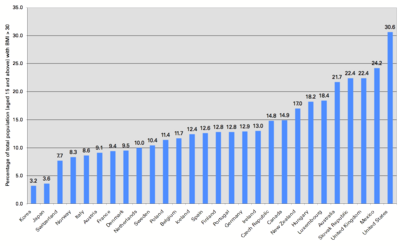JAMES HILL, PH.D.
Director of the Center for Human Nutrition at the University of Colorado
LOUIS ARONNE, M.D.
Clinical associate professor of medicine at Cornell University Medical College
CRISTINA BEATO, M.D.
Acting assistant secretary for health with the U.S. Dept. of Health and Human Services
DAVID KATZ, M.D.
Internist and director of the Yale Prevention Research Center
WAYNE MILLER, PH.D.
Professor of exercise science at George Washington University Medical Center
The numbers are numbing. Yes, America is in the midst of a major health crisis. But how'd we get here? How did 127 million adults suddenly become part of a national epidemic?
BEATO Obesity is by no means something that happened to us overnight. It's been creeping up on us for decades.
ARONNE True. This is not a new problem. We just woke up. We finally realized the magnitude of what was going on around us.
HILL Foods became cheaper, and the amount of physical activity required for daily living plummeted.
BEATO Exactly. People used to burn calories for survival. Now we have machines to do our work for us. This leaves us with nothing to do but sit around, watch TV, and munch on some of the 3,000 new snack foods that come out each year.
What if things don't change?
ARONNE Some experts estimate that, at some point, everyone in the country will be obese.
KATZ It's a catastrophe! I predict that if we don't make some changes within the next 10 years, it won't be unusual at all for ER doctors to be treating 17- or 18-year-old kids for heart attacks.
ARONNE Can you imagine? We're going from one generation who couldn't get enough to eat to the next that has too much food and can't stop eating.
What about corporate America and the government? What's their role in helping get things back on track?
MILLER It's everyone's responsibility to fight this epidemic. You can't blame it all on McDonald's. You have to make a choice to eat--or not eat--their food.
KATZ But you can't just ask people to be more responsible! To take responsibility, you must be empowered! Our task is to provide the public with knowledge, to give the public the information we need to change our environment. Only then can we call upon "responsibility."
HILL Solving this problem requires changes in every sector. We need industry to step up and make changes where they can. And we need the government to provide incentives for making those changes.
ARONNE Incentives, yes, but not legislation. The government needs to fund additional research, and not create or change laws. There's growing evidence, for example, that sweet, starchy, fatty foods can change the brain's metabolism--encouraging you to eat more of those foods than you normally would.
Really? That sounds like it could be a huge problem.
ARONNE It is. Since these are the types of foods companies advertise and sell to the public, we need to study them. Funding for nutritional research is better than it used to be, but it's not even close to where it should be--to the amounts spent studying other fields.
KATZ The food industry is obviously a major culprit in the epidemic, but we can't expect or require too much from them. They're just trying to keep the customer satisfied. If we demand nutritious foods, we would get them--no legislation or litigation required. Look what happened with the low-carb foods --the public wanted them and now they're everywhere.
So if it's not corporate America's fault, then whose is it? If you had to pick one trigger for the epidemic--a villain responsible for our ever-expanding waistlines--who or what would it be?
BEATO Without a doubt, you have to put the blame on America's sedentary lifestyle. We're just not as active as we used to be.
ARONNE Right. If people got enough exercise, things would be different. We could all eat what we want to.
KATZ But physical activity alone is not the answer. We'll never control epidemic obesity without addressing calories in, as well as calories out. We have tasty, high-calorie foods available to us everywhere we go.
MILLER Activity and industry have a role in the epidemic, of course, but you can't discount the behavioral aspect of eating. Many people are overweight because they're stressed and trying to relax--food becomes their crutch.
HILL This is the problem with placing blame. There isn't one single villain behind America's weight gain. It's a combination of many things, and they all need to be addressed. You can change one or two factors, but the problem won't go away until we sit down and address the situation as a whole.
What's America's biggest obstacle to losing weight right now?
MILLER There's so much cynicism out there. Who can I trust? I can't trust the government. Food manufacturers are just trying to sell their products. Even my doctor is just telling me to lose weight but not telling me how to do it. Nobody knows what to believe.
ARONNE A lot of that comes back to diet. There's this idea that one diet has to be right for everybody, but that's not true. The best diet is the diet that's right for you. It's the diet that you will stick with for years, not weeks or days.
KATZ Right. Some colleagues and I just finished a study for the Centers for Disease Control and Prevention where we looked at more than 350 weight-loss studies conducted over the past 40 years. And the results show that all diets work--but only for short-term weight loss. No "diet" will help you control your weight over the course of a lifetime. We keep making the same mistakes: a focus on quick fixes, rather than lasting benefits; a focus on weight not health, diet not lifestyle.
MILLER There's so much junk out there people are trying to sort through.
KATZ Food is fuel that runs these incredible machines we call our bodies. Life shouldn't be about how much we weigh. It should be about the health of our bones and teeth, the clarity of our vision, and that's all influenced by the quality of the fuel we eat. Not whatever trendy diet is going to lower the number on the scale.
The average American--fit or not--gains one to two pounds of fat a year. What one change should guys make now to avoid gaining that weight?
HILL The key to staying thin is regular physical activity. If you're already active, make it a priority to stay that way, no matter what. It's easy to put off exercise when you're young and busy, but you can't fall into that trap.
BEATO You also shouldn't try to turn your life around all at once. If you make changes in small, controllable increments, you'll be less likely to fall off your program, and much more likely to meet your goals--whether that's losing weight or gaining muscle mass.
KATZ Be a very choosy consumer. Don't let yourself be manipulated by ads or the claims on labels.
MILLER If you can, try to determine if you're using food to address other needs, Emotions drive many men's cravings. Name a stress food--99% of the time we say ice cream and chocolate. It's not a coincidence that these are some of the primary foods that contribute to weight gain.
ARONNE And eat more vegetables. Not because they'll necessarily help you lose weight--but just because they're good for you!
THE WAR OF FAT
CHART-TOPPERS
The Guinness Book of World Records gives the trophy for the world's heaviest human to Seattle's Jon Brower Minnoch, who weighed in at 1,400 pounds before his death in '83. Dimensions magazine (a publication for Big Beautiful Women and the guys who love 'em), however, tips its scale to Michigan's Carol Yager, who claims to save weighed 1,600 at her peak of beauty.
Belisa Vranich is a psychologist specializing in nutrition. She fights fat by salsa dancing and scuba diving.
COPYRIGHT 2004 Weider Publications
COPYRIGHT 2004 Gale Group




